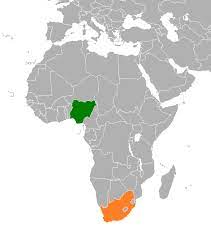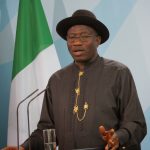Manir Dan Ali, Is’haq Modibbo Kawu, Aisha Umar- Yusuf & Adie Vanessa Offiong
WEEKLY Trust: You have said once before that it was a pity that South Africa doesn’t appreciate what Nigeria has done fo r the anti-apartheid struggle. It was touching when you said the first Prime Minister o f Nigeria, Tafawa Balewa, secretly contributed two hundred and sixty pounds or so to the anti-apartheid struggle which was used to purchase guns. Could you reflect more on the issue o f Nigeria’s role in the South African struggle?
Winnie Madikizela-Mandela: Well, I put it that way because it is true. There is a general feeling that the relationship between our two countries is not what it should be. But there are very many other reasons for that. I just w anted to highlight the fact that we come from a very long history of good relations between South Africa and Nigeria. And of course it was understandable that there that there was little information about that.
During those years, countries contributed to the Africa National Congress, (ANC) privately and secretly, because, for any country to have contributed towards our struggle was considered heresy by the regime of the day. There are many other countries that did the same, underground. You know the history of the then apartheid regime. They attacked those countries that knew assisted us. You know of the raids on our sister countries Lesotho, Swaziland and the rest. That resulted in very tragic relationships between the various countries and the then apartheid regime.
Therefore, it was important to protect those countries that made contributions. It was in that sense that I thought this ought to be known to South Africans that Nigeria contributed a great deal towards our liberation. The younger generation would not necessarily know this except for those few who are survivors. It is no secret that we have had our awkward moments with various countries because of the situation in South Africa. It was in that sense that I thought we should know that we have special relations with Nigeria.
WT: Your Ambassador once raised the issue of there being a kind o f imbalance in the business relationship between Nigeria and South Africa. As someone who was in the thick o f it, how would you relate with the relations between our two countries?
Madikizela-Mandela: It is understandable that there should those sorts of imbalances because those contributions happened during those times and the new generation that is in government now do not really know. We do know we have problems with each other. There are various conflicts as a result of many other reasons that various governments contributed to our struggle for liberty.
WT: The outbreak o f Xenophobia can be reflected as one o f the problems. One of them you have touched, which is the fact that there is not enough understanding as regards the relations to peoples’knowledge in African countries and South Africa. But isn’t it also a failure that post-apartheid South Africa has not consciously thought o f the issue o f solidarity with other countries? Have you tried to teach the actual history?
Madikizela-Mandela: I’m not really entitled to speak on that issue on behalf of the South African government. It is the responsibility of our foreign affairs ministryto deal with those issues. And we are in the fifteenth year of our new dispensation in South Africa. That should have started a long time ago and of course South Africanscan’t know it all. And we have come from a very brutal past and we had a lot ofproblems to deal with. One of them was the inter-relation between the outlaw states,which had started a liberation movement of their own and we were together in the saga with other liberation movements in their countries. So it was the responsibility of the new governments to be sensitive tothose issues. It is no secret that till today there still are problems between Zimbabwe and South Africa and you wouldn’t expect South Africa to just single out Nigeria. Governance isn’t a process that just happens overnight. In time to come, I suppose we will have time to iron out those relations. We have millions of problems to deal with in our new government. We are still battling to establish ourselves fifteen years down the line after we have gained freedom. The course isn’t easy and one of the problems we had to deal with was specifically those inter-African relations.
And it is not just the Nigerians. We had to think of Zimbabwe, Swaziland and Lesotho. We have problems every other country experiences. South Africa just happens to be an industrially developed country which is, of course, very attractive. There are ordinary m en on the streets who unfortunately feel invaded by the so-called foreigners. But we all know that it is wrong to regard our fellow Zimbabweans, Nigerians, etc., as ‘foreigners’ because that does not apply to other nationalities. We have never heard of xenophobia against Italians or Greeks. It is all to do with the fact that the other countries are not as rich as South Africa. It is as a result of citizens of other countries coming to look for greener pastures in South Africa and the feeling that people from other countries have taken their jobs.
WT: Is the ANC worried about a situation where all those people who sort of left would start a new party?
Madikizela-Mandela: We are not worried. We know that the ANC is the people’s choice. We know we have overcome those problems; we know that ultimately our children will understand what I have explained now. And of course our enemies will continue try to divide us. We have problems amongst ourselves.
WT: After the banning of and the imprisonment o f so many people in 1960, that was a moment o f tremendous loss of hope. You, as an individual, parried the hopes o f an entire people. When you look back, given the odds, did you ever think that you ’d attain what you eventually did?
Madikizela-Mandela: I don’t think that you take a decision to be what you are to be. I never took a conscious decision to be where I am. I was made by the history of my country. I attribute what I am to the masses of my country. I became part and parcel of the struggle. To me, it was my mission to liberate my country.
It became my mission when [Nelson Mandela] was arrested. When he was arrested, I was worried for that. I was too young and hadn’t envisaged the monumental task that loomed. I was so young. Of course I was dependent on the senior leadership of the time. I remember knowing the senior leadership o f the ANC, personally. I knew the entire leadership of the then communist party. I knew these great people, but they just passed through my life. I cooked for them at home. I never dreamed it but suddenly these giants were away from me and I had to survive. That is the only decision I took consciously. I handled those boys and girls singlehandedly and today they are top military guys in the country because of the morals I instilled in them. This is what I thought of consciously when the country was in ruins. I went through and faced a lot of challenges. That why I am here before you today.
WT: Pan-Africanism has always been a major source of inspiration to South Africans but was also problematic because it posed a problem to many people. Would you say Pan-Africanism as an ideology, was a racist thing?
Madikizela-Mandela: Not to many people. It depends on who is defining it. For
instance, a brother sees the other as being black because he slightly different from him in colour, culture and upbringing. We helped to make it be seen that South Africa belongs to all those who live in it. Now, when we did this would we then say, we will chase the white men to sea?
WT: South Africans have remained loyal to you because they appreciate the fact that if anybody made a sacrifice of tremendous nature, you did.
Madikizela-Mandela: I think they appreciate me because I was with them throughout, throwing stones and carrying out protests with them. It is okay for my children to be out of Soweto but it is never okay for me to dessert my people in Soweto. Soweto was an integral part of me and I started my mission from there and couldn’t just abandon it.


